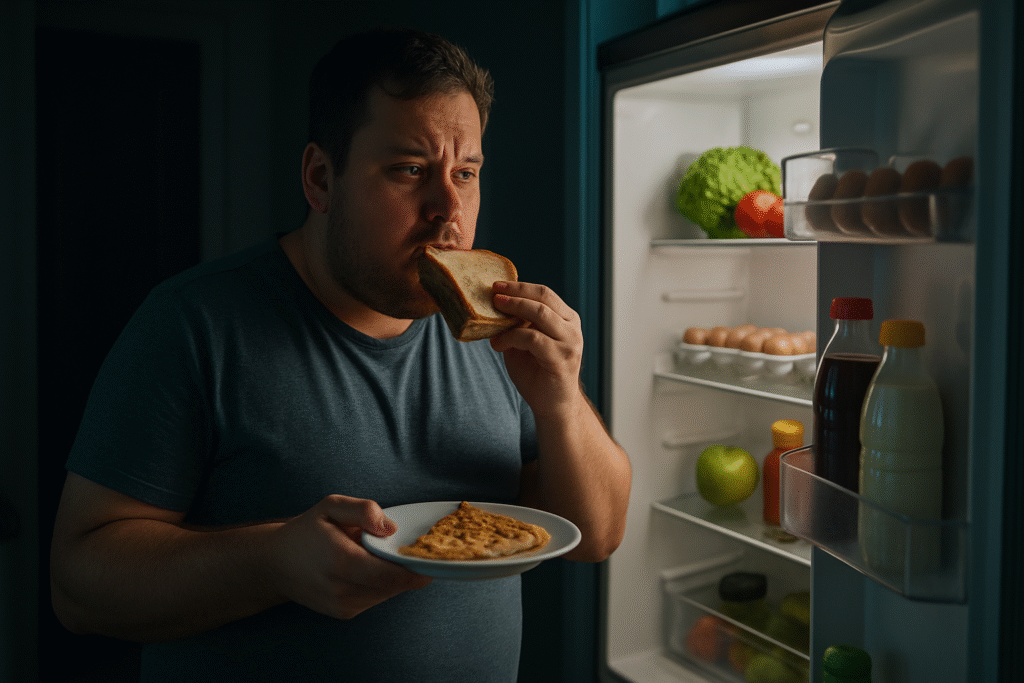Does Eating Late at Night Make You Gain Weight? The Science Behind It
Late-night eating is a common concern for many people trying to manage their weight. But does eating late at night really lead to weight gain? The science behind this issue is complex and involves various factors. Understanding the relationship between late-night meals and weight gain can help you make informed choices about your eating habits.
First, it’s essential to recognize that weight gain occurs when you consume more calories than you burn. This means that the timing of your meals may play a role, but it isn’t the only factor at play. You can eat late at night and still maintain a healthy weight if you are mindful of your overall caloric intake and physical activity throughout the day.
Several studies have examined the impact of late-night eating on weight. Here are some of the key findings:
- Calorie Surplus: Many late-night snacks tend to be high in calories. If you’re not careful, these extra calories can lead to a surplus, resulting in weight gain.
- Types of Foods: The foods commonly chosen for late-night snacking—like chips, candy, and ice cream—are typically high in sugar and fat. These snacks can lead to increased cravings and a tendency to overeat.
- Stats from Research: A study published in the journal Obesity found that participants who ate late at night consumed significantly more calories than those who didn’t. This suggests that a late-night eating pattern may contribute to an increase in overall calorie intake.
Aside from calorie intake, the body’s metabolic processes also play a role in how late-night eating can affect weight. Here are some critical insights about metabolism and meal timing:
Metabolism Rates: Your body has a natural circadian rhythm that dictates many biological processes, including metabolism. Eating at irregular hours can disrupt this rhythm, potentially influencing how efficiently your body processes food.
Moreover, the time of day can affect hormone production. Hormones like insulin and cortisol, which play critical roles in metabolism, can fluctuate throughout the day. Consuming food late may lead to increased insulin resistance over time, making it harder to maintain a healthy weight.
Another aspect of late-night eating is its link to lifestyle habits. Individuals who frequently eat late might also have associated behaviors that contribute to weight gain, such as:
- Being less active during evening hours, leading to fewer calories burned.
- Increased consumption of stress-related snacks, sometimes called “emotional eating.”
- Watching TV or browsing the internet while snacking—often leading to mindless eating.
So, how can you manage late-night eating without risking weight gain? Here are some strategies:
- Plan Ahead: If you know you’ll be hungry later in the evening, prepare a healthy snack ahead of time, like yogurt, fruits, or vegetables with dip.
- Stay Mindful: Pay attention to your hunger signals. It’s okay to have a light snack, but avoid bingeing out of boredom or habit.
- Create a Routine: Establish a consistent eating schedule to help regulate your body’s clock, making it easier to feel satisfied by dinner time, which can prevent late-night cravings.
Ultimately, the question isn’t just about whether eating late at night makes you gain weight; it’s more about the choices you make when you do eat late. Prioritizing healthier options and being mindful of portion sizes can mitigate any potential weight gain.
For more in-depth information on how meal timing affects your metabolism, visit Harvard T.H. Chan School of Public Health and explore research-backed insights. Additionally, for practical tips and strategies on weight control, check out the resources at CDC’s Healthy Weight.
| Late-Night Eating Factors | Impact on Weight |
|---|---|
| High-Calorie Snacks | Increases calorie intake |
| Irregular Eating Patterns | Disrupts metabolism |
| Mindless Eating | Leads to overconsumption |
Recognizing that late-night eating can contribute to weight gain is crucial, but it is not the only factor. Balance is key; managing your overall dietary choices, portion sizes, and physical activity levels is essential for achieving and maintaining a healthy weight.
The Role of Metabolism in Late-Night Eating Habits
Eating habits have a significant effect on your overall health, and late-night eating is a common concern. Understanding metabolism plays a crucial role in this discussion. Metabolism refers to the chemical processes in your body that convert food into energy. It involves two main processes: catabolism (breaking down food) and anabolism (building up compounds).
Your metabolism doesn’t stop functioning when you sleep. In fact, your body continues to burn calories as it performs essential functions, such as repairing tissues and regulating hormones. However, the timing of your meals can impact how efficiently your metabolism works.
How Metabolism Works at Night
During the night, your body’s energy requirements change. The metabolic rate slows down, which is why many people worry about eating late. Here’s how it typically breaks down:
- Caloric Expenditure: At rest, your body burns fewer calories compared to when you are active. This might lead to thoughts that eating late could lead to weight gain since fewer calories are being expended.
- Insulin Sensitivity: Your body’s sensitivity to insulin changes throughout the day. Late-night eating might alter these levels, impacting how effectively your body uses energy.
- Food Choices: The choices you make late at night are often less healthy. Snacks like chips and candy may lead you to consume more calories than healthier alternatives, which could result in weight gain.
Factors That Influence Late-Night Eating
Several factors affect metabolism and influence late-night eating habits:
- Sleep Quality: Poor sleep can impact your metabolism and lead to increased cravings for unhealthy foods, which may heighten the likelihood of eating late.
- Stress Levels: High stress can trigger late-night snacking as a coping mechanism, leading to weight gain over time.
- Daily Activity: An active lifestyle can improve your metabolism, allowing you to handle late-night food better than if you lead a sedentary life.
Metabolism Myths and Facts
It’s essential to debunk some common myths surrounding late-night eating and metabolism:
| Myth | Fact |
|---|---|
| Eating after 8 PM makes you gain weight | Weight gain is influenced more by overall caloric intake versus expenditure than by the time you eat. |
| Skipping breakfast speeds up metabolism | Eating a balanced breakfast helps maintain your metabolic rate throughout the day. |
| All snacks are bad at night | Healthy snacks can be beneficial if they fit within your daily caloric goals. |
Strategic Late-Night Eating
If you enjoy eating late at night, consider these strategies to minimize negative impacts on your metabolism:
- Opt for Healthy Snacks: Foods like yogurt, fruit, or vegetables with hummus can satiate your cravings without leading to excessive calorie intake.
- Practice Portion Control: Keep your portions small to avoid overeating.
- Be Mindful: Pay attention to what and why you are eating. Avoid snacking out of boredom or stress.
- Promote Better Sleep: Ensure that you have a good sleep environment to promote metabolic health.
Consult Healthcare Professionals
If late-night eating is a concern for you, it might be worthwhile to consult with a registered dietitian or nutritionist. They can provide personalized insights based on your lifestyle and health goals. Resources like Eat Right offer helpful advice on maintaining healthy eating habits.
Understanding the role of metabolism in late-night eating can significantly impact your overall health journey. By focusing on nutritional choices, making wise decisions about timings, and understanding how your body functions, you can enjoy your late-night meals without excessive worry about weight gain.
If you are looking for more information, consider visiting Healthline for more insights on this topic.
How Food Choices Impact Weight Gain When Eating Late
Many people wonder if eating late at night contributes to weight gain. While it’s a common belief that the timing of meals is a major factor, it’s essential to look deeper at the kinds of foods you choose during those late-night dining sessions. Different food choices can significantly influence how your body stores or burns calories.
One crucial factor is your overall calorie intake throughout the day. If you consume more calories than your body needs, regardless of when you eat, you will likely gain weight. Late-night snacking can lead to overeating if you’re not mindful. That’s why being intentional about your food choices is vital.
When you find yourself reaching for late-night snacks, consider the following:
- High-Calorie Snacks: Foods like chips, cookies, and sugary desserts are calorie-dense and can quickly lead to weight gain if consumed frequently at night.
- Nutrient-Dense Options: Choosing healthier options like fruits, nuts, or yogurt is better for late-night snacking. These foods provide essential nutrients without excessive calories.
- Liquid Calories: Beverages like soda or alcohol often add up quickly in calories without making you feel full. Opt for water or herbal teas instead.
Your food choices during late-night eating can also impact your metabolism. Foods high in sugar and unhealthy fats may lead to spikes in blood sugar levels, potentially affecting how your body processes the next meal. This could result in increased cravings for unhealthy snacks later on. Conversely, high-protein foods can help you feel satisfied and reduce the likelihood of late-night binges.
Metabolism and Eating Late at Night
Research indicates that your body’s metabolism can be influenced by the type of foods you eat and the timing of those meals. When you eat late, your body may process food differently than during daytime hours. Here’s how:
| Food Type | Metabolic Impact |
|---|---|
| High-Carbohydrate Foods | Can spike blood sugar, leading to energy crashes and cravings. |
| High-Protein Foods | Can boost metabolism and promote satiety, making them ideal for late-night meals. |
| High-Fat Foods | May slow down digestion, leading to discomfort and poor sleep quality. |
In addition to food types, pay attention to portion sizes during late-night eating. Even healthy snacks can lead to weight gain if consumed in large amounts. Consider using smaller plates or bowls to help control portion sizes. This technique makes it easier to manage how much you eat while still enjoying a variety of foods.
Moreover, consider the emotional aspect of eating late at night. Many people indulge in snacks while watching TV or working late, often leading to mindless eating. This practice can result in consuming more calories than intended. Stay mindful of your hunger cues and consume food only when you feel genuinely hungry.
Practical Tips for Late-Night Eating
To help you make healthier food choices late at night, consider these practical tips:
- Plan your meals: Prepare healthy snacks in advance to avoid less nutritious options.
- Keep unhealthy snacks out of the house: If you don’t have easy access to unhealthy snacks, you’re less likely to indulge.
- Practice mindful eating: Pay attention to what you eat and savor each bite.
- Stay hydrated: Sometimes, thirst is mistaken for hunger. Drink water before reaching for a snack.
The relationship between eating late at night and weight gain is complex and significantly influenced by food choices. While it’s not the time but rather the type of food you consume that can lead to weight gain, making mindful decisions can keep your late-night eating in check. Explore more about this subject on health-oriented websites like WebMD and Healthline for additional tips and advice.
Debunking Common Myths About Nighttime Snacking
Nighttime snacking is a behavior many people enjoy, yet it comes with a lot of myths. Understanding what’s true and what’s not can help you make better choices about your eating habits. Let’s explore these myths together to shed light on the reality of eating late at night.
The Myth: Eating After 8 PM Causes Weight Gain
Many believe that if you eat late at night, it will result in weight gain. While it’s true that consuming excess calories can lead to weight gain, the time of day you eat is less important than what you eat and how much you consume. Evidence suggests that it’s the overall caloric intake and diet quality that matter most, not just the timing.
The Myth: Nighttime Snacks Are Necessarily Unhealthy
Another common myth is that all nighttime snacks are unhealthy. It really depends on your choices. While reaching for chips or ice cream might not be the healthiest option, you can snack wisely at night. Consider these healthier options:
- Greek yogurt with berries
- Air-popped popcorn
- Vegetables with hummus
- Nuts in moderation
These options provide nutrients without excessive calories, allowing you to snack guilt-free.
The Myth: Nighttime Eating Disrupts Sleep
Some people fear that eating at night will disrupt their sleep. While heavy meals can cause discomfort, light snacks may actually help. For example, foods containing tryptophan, such as turkey and bananas, can promote better sleep. It’s important to choose what and how much you eat to avoid any potential sleep disturbances.
The Myth: Late Night Eating Equals Overeating
Many assume that eating late leads to overeating. In reality, this can happen at any time of the day. The key to avoid overeating is to listen to your hunger cues. If you are hungry at night, a small snack can be entirely appropriate. Ignoring hunger can lead to feelings of deprivation, which may cause you to eat more during the day.
The Myth: You Should Skip Breakfast If You Snack at Night
Some people might believe that nighttime snacking means they should skip breakfast the next morning. This is not the case. Sustainable eating patterns focus on moderation and balance. Skipping meals can lead to decreased energy levels and increased hunger, potentially causing unhealthy eating habits. Instead, maintain a balanced diet throughout the day.
Real Benefits of Nighttime Snacking
Here are a few benefits you can enjoy from smart nighttime snacking:
| Benefit | Description |
|---|---|
| Improved Satiety | A small, healthy snack can curb late-night hunger and keep you satisfied overnight. |
| Enhanced Recovery | Nighttime is when your body recovers. Eating a nutrient-dense snack can support muscle repair, particularly after workouts. |
| Better Sleep | Light snacks promote relaxation and can aid in a better night’s sleep. |
Emphasizing quality over quantity can transform your nighttime eating into a positive experience. Rather than viewing it negatively, embrace the potential benefits of smart snacking.
Understanding Your Body’s Needs
It’s essential to understand your own body. If you find yourself consistently hungry at night, consider adjusting your meals during the day. A balanced diet with ample protein, fiber, and healthy fats will help keep you full longer. Focus on your individual eating habits, and don’t let myths dictate your choices.
By debunking these common myths about nighttime snacking, you can feel more confident in your eating choices. Having a healthy relationship with food is vital, so listen to your body. Whatever time of day it is, remember that making informed decisions is the key to a balanced diet.
For more information on healthy snacking, explore EatRight.org or check out ChooseMyPlate.gov.
The Psychological Effects of Eating Late in the Evening
Eating is an essential part of our daily lives, but the timing of our meals can greatly impact our psychological wellbeing. Many people wonder how eating late at night can affect their mental health. While the research is still evolving, a few notable trends and insights have emerged.
One of the most significant psychological effects of eating late in the evening is related to emotional eating. Many individuals find themselves reaching for snacks late at night as a response to stress, anxiety, or sadness. This behavior often leads to a cycle where the individual feels guilty after eating, which can exacerbate negative emotions further. The frustration from late-night eating can also manifest in self-criticism, impacting self-esteem and overall mental health.
Late-night eating can disrupt your sleep patterns. Consuming heavy meals or sugary snacks before bedtime can lead to poor sleep quality. Lack of sleep is linked with mood disorders such as depression and anxiety. Sleep is crucial for mental clarity and emotional regulation. Consequently, the choice of food you eat late at night might not just matter for your waistline but also for your mental wellness.
Furthermore, late-night eating can create a habit of indulging in unhealthy food options. Foods high in sugar or fat can lead to temporary spikes in energy followed by crashes that affect your mood. Consuming comfort foods can form an unhealthy relationship with food, associating emotional states with eating. This often leads to cravings and reinforces unhealthy eating patterns that could affect your mental health over time.
Another psychological concern is the impact of social dynamics surrounding late-night eating. Eating late often occurs during social activities or gatherings. While these situations can bring joy, they can also create feelings of pressure to participate in eating behaviors that may not align with one’s health goals. This can lead to ongoing feelings of anxiety and regret.
Here are some psychological effects people may experience from late-night eating:
- Emotional Eating: As mentioned earlier, late-night eating is often linked to coping with emotions.
- Sleep Disruption: Late meals can interfere with sleep quality.
- Guilt and Shame: Those who eat late often report feelings of guilt.
- Social Pressure: Eating late with friends can lead to unwanted choices.
- Increased Cravings: Consuming high-sugar foods can lead to further cravings.
Considering these effects, it is essential to be mindful of your eating habits, especially in the evening. If late-night snacking becomes a pattern, it’s worthwhile to examine the reasons behind it. Are you truly hungry, or are there other emotions at play? Keeping a food journal can help identify triggers that lead to late-night eating.
In addition to psychological effects, consider how your eating habits can affect your physical health. If you regularly find yourself grazing late at night, you may face weight gain, digestive issues, or other health problems that can add stress and anxiety into your life.
To promote a healthier relationship with food, it can be beneficial to make conscious choices. Consider preparing light snacks ahead of time, such as fruits or vegetables, that satisfy cravings without the added guilt. Alternatively, involving yourself in other evening activities may serve as a distraction from late-night eating habits.
If you’re grappling with late-night eating, understanding the psychological implications is crucial for boosting your overall mental health. Looking to resources can provide further guidance—consider visiting websites like Psychology Today or NCBI, which offer comprehensive insights into general eating behaviors and their psychological effects. By being proactive and mindful, you can reshape your late-night routines for a healthier mind and body.
Ultimately, the connection between what you eat and your mental health is strong. Understanding these connections can lead to more informed choices and a better relationship with food over time.
Strategies for Healthy Late-Night Eating Without Gaining Weight
Many people wonder if eating late at night can lead to weight gain. While snacking after dark often gets a bad rap, it’s essential to consider what, when, and how you eat during those evening hours. You can enjoy late-night eating without adding extra pounds by following some useful strategies.
Choose Healthier Snacks
The first step in healthy late-night eating is selecting nutritious snacks. Instead of reaching for chips or ice cream, consider these options:
- Fruits and Vegetables: Carrot sticks, cucumber slices, or fruit like apples and berries provide essential nutrients and satisfy cravings.
- Nuts and Seeds: A small handful of almonds or sunflower seeds can offer healthy fats and protein to keep you full.
- Greek Yogurt: High in protein, a small bowl of Greek yogurt can be both filling and delicious. Top it with a little honey or fruit!
- Whole Grain Crackers: Pair whole grain crackers with a slice of cheese for a good balance of carbs and protein.
Watch Portion Sizes
Mindful eating plays a crucial role in preventing weight gain. Even healthy snacks can lead to unwanted weight if portion sizes are not controlled. Here are a few tips to keep your portions in check:
- Use Smaller Plates: Small plates can trick your brain into thinking you’re eating more than you are.
- Pre-Portion Your Snacks: Before you sit down to watch TV, pre-portion your snacks so you don’t eat directly from the bag or container.
- Listen to Your Body: Pay attention to your hunger cues. Eat only until you feel satisfied, not stuffed.
Set a Cutoff Time
Establishing a specific time to stop eating can be a game-changer. Here’s how to set and stick to your cutoff time:
- Pick a Time: Aim to finish eating at least two to three hours before bedtime.
- Plan Ahead: If you know you will want a snack, plan it ahead of time and adjust your meal schedule accordingly.
- Stay Busy: Engage in activities that keep your mind off eating. Bring out a hobby or read a book in the evening.
Stay Hydrated
Sometimes, we confuse thirst with hunger. Drinking water can help you stay hydrated and may even curb late-night cravings. Here are some tips:
- Drink Water First: If you feel hungry, drink a glass of water before reaching for snacks.
- Infuse Flavor: If plain water is too boring, try adding lemon or cucumber slices to enhance the taste.
Be Mindful of Sleep
Your sleep quality can affect your cravings and hunger hormones. Poor sleep can lead to increased appetite, especially for high-calorie foods. Here’s how to ensure better sleep:
- Stick to a Sleep Schedule: Going to bed and waking up at the same time each day helps regulate your body clock.
- Create a Relaxing Bedtime Routine: Engage in calming activities like reading or meditation before bedtime.
- Limit Screens Before Bed: The blue light from screens can interfere with your sleep. Try to put away devices an hour before you go to sleep.
Opt for Low-Calorie Drinks
If you’re craving something sweet but want to avoid calories, consider these alternatives:
- Herbal Teas: Unsweetened herbal teas can satisfy your craving without the calories.
- Sparkling Water: Flavor it with herbs or pieces of fruit for a refreshing drink.
By applying these strategies, you can enjoy late-night snacks and keep your weight in check. Remember, it’s not just about when you eat but also what you choose to fuel your body. For more tips on weight management and healthy eating, visit EatRight.org or check out Healthline’s Nutrition Section.
The Influence of Sleep Patterns on Late-Night Eating and Weight Management
Many people wonder how sleep patterns impact late-night eating and its effects on weight management. Research suggests there is a significant relationship between how well you sleep and what you consume late in the evening. Understanding this connection can help you make better dietary choices and maintain a healthier weight.
The Link Between Sleep and Late-Night Eating
Your sleep cycle influences your hunger hormones, which play a crucial role in appetite regulation. When you don’t get enough sleep, levels of the hormone ghrelin, which signals hunger, increase, while levels of leptin, which signals satisfaction, decrease. As a result, you may feel hungrier and more tempted to eat late at night.
How Sleep Patterns Affect Your Choices
When you’re sleep-deprived, your brain’s reward center becomes more active, craving high-calorie, sugary, or fatty foods. This craving can lead to unhealthy snacking at night, ultimately contributing to weight gain. Factors that influence sleep patterns include:
- Sleep duration: Enjoying 7-9 hours of uninterrupted sleep is beneficial.
- Sleep quality: Deep, restorative sleep is essential for healthy hormone levels.
- Sleep timing: Going to bed and waking up at consistent times supports a stable sleep cycle.
Effects on Metabolism
Chronic sleep deprivation does more than make you hungry. It can also slow down your metabolism. When your body thinks it’s in a state of deprivation, it may conserve energy by burning fewer calories. Additionally, stress hormones such as cortisol can increase, further complicating weight management. A lack of sleep can lead to:
- Impaired glucose metabolism
- Increased fat storage
- Greater likelihood of developing insulin resistance
Strategic Late-Night Eating
If you find yourself needing to eat late at night, consider making healthier choices. Opt for foods that are nutrient-dense but low in calories. Some options include:
- Fresh fruits and vegetables
- Low-fat yogurt
- Nuts in moderation
- Whole-grain crackers or rice cakes
Portion control is key. Even healthy snacks can lead to weight gain if consumed in large amounts. Aim for a small, well-balanced snack that can satisfy your hunger without overloading your calorie intake.
Creating Healthier Sleep Habits
To improve your sleep patterns, consider adopting the following habits:
- Establish a consistent bedtime routine to help signal your body that it’s time to sleep.
- Avoid screens from phones, tablets, or TVs at least one hour before bed.
- Create a comfortable sleep environment: a dark, quiet, and cool room can make a big difference.
Consulting Health Professional
If you find it difficult to manage your weight and sleep simultaneously, it may be helpful to speak with a healthcare professional. They can provide personalized strategies and support to help you establish healthier habits.
For more evidence-based insights on sleep and weight management, check out articles from NCBI and Harvard Health.
| Sleep Duration | Impact on Weight |
|---|---|
| Less than 5 hours | Increased hunger; high risk of obesity |
| 5-6 hours | Moderate risk of weight gain |
| 7-9 hours | Optimal for weight management |
| More than 9 hours | Possible weight gain; may indicate underlying health issues |
By understanding the influence of sleep patterns on late-night eating and weight management, you can take actionable steps to create a balance between your eating habits and overall health. Prioritizing both sleep and smart food choices will lead to more effective weight management in the long run.
Key Takeaway:
Key Takeaway: Understanding Late-Night Eating and Weight Management
The question "Does eating late at night make you gain weight?" often sparks debate among health enthusiasts. To unpack this issue, it is essential to explore the science behind late-night eating habits. Research indicates that it’s not merely the timing of meals that contributes to weight gain, but several interrelated factors, including metabolism, food choices, and psychological aspects.
Metabolism plays a crucial role in understanding how our bodies process food consumed at night. When you eat late but maintain a caloric balance, your metabolism can still operate efficiently. However, poor food choices, such as high-calorie snacks or sugary desserts, can lead to excess caloric intake, resulting in weight gain. It’s vital to make healthier choices if you must eat late, opting for lighter snacks rather than high-fat or high-sugar options.
Common myths surrounding nighttime snacking, such as the belief that all food consumed after 8 PM leads to weight gain, are debunked through a closer examination of research. While it is true that late-night eating can be associated with mindless snacking and emotional eating, it is not the timing alone that dictates weight gain but rather the overall lifestyle and dietary patterns.
Psychologically, late-night eating can stem from emotional triggers or habits formed over time. Being aware of these triggers can lead to healthier eating patterns. For those who struggle with late-night cravings, strategies like preparing light, nutritious snacks ahead of time or establishing a regular sleep schedule can help curb excessive eating at night.
Sleep patterns significantly influence weight management. Poor sleep can increase hunger hormones and cravings, making late-night eating more likely. Ensuring you get adequate and restful sleep can help mitigate these urges, supporting your weight management efforts.
While late-night eating can contribute to weight gain, it largely depends on what food choices you make, your metabolism, and lifestyle habits. Understanding these interconnected factors allows you to enjoy the occasional late snack while maintaining a healthy weight. By choosing wisely, being mindful of psychological triggers, and prioritizing sleep, late-night eating can be managed without derailing your weight goals.
Conclusion
Understanding whether eating late at night leads to weight gain involves more than just the timing of meals. Scientific studies show that our bodies metabolize food differently at various times of day. Metabolism plays a crucial role, as late-night eaters may find it slows down, impacting how the body processes calories.
The food choices you make late at night matter significantly. Opting for high-calorie, processed snacks can quickly contribute to weight gain, while nutritious options like fruits or yogurt can provide satisfaction without excessive calories. It’s essential to differentiate between hunger and emotional eating, as psychological factors often drive late-night snacking.
Many myths exist around the topic, with common beliefs suggesting that eating after a specific hour will inevitably lead to weight gain. However, debunking these myths reveals that it’s the overall dietary habits and lifestyle that determine weight gain, not merely the clock on the wall.
Sleep patterns are another vital factor influencing late-night eating. Poor sleep can trigger late-night cravings, leading to unhealthy snacking. Prioritizing sleep, therefore, can aid in managing hunger and weight effectively.
Ultimately, you can enjoy late-night eating without worrying about weight gain by making mindful food choices, understanding your body’s signals, and prioritizing sleep. There’s no one-size-fits-all answer, but by approaching late-night eating with awareness and moderation, you can maintain a healthy balance while still satisfying those evening cravings.
















